The Ultimate Guide To Preparing for Music Competitions, Public Performances & Livestreams
A comprehensive guide for music students and parents preparing for competitions, public recitals, or virtual performances. Learn how to select the right repertoire, manage performance anxiety, optimise tech setups for Zoom recitals, and build confident performers - on stage or online.
MUSIC EDUCATIONPARENTAL INVOLVEMENTMUSIC EXAMS & CERTIFICATIONS
The Ultimate Guide To Preparing for Music Competitions, Public Performances & Livestreams
Whether it’s a child’s first recital, a major music competition, or a live-streamed performance on Zoom or Instagram, public performances are powerful stepping stones in a young musician’s journey. These events help build not just technical mastery, but confidence, stage presence, and resilience. This blog is written to support both students and parents through the preparation process - whether performing in a concert hall or from your living room!
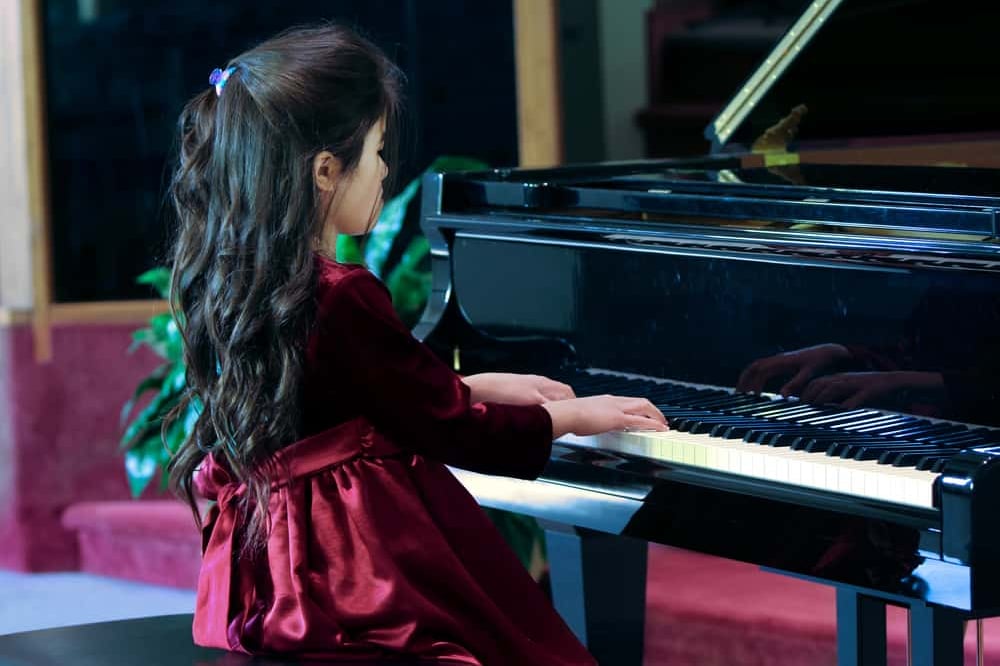

🎯 1. Know the Goal: What Are You Preparing For?
First, understand the type and purpose of the performance:
Competitions often focus on technical accuracy, timing, and interpretation under pressure.
Public recitals aim to develop stage confidence and artistic expression.
Livestreams (via Zoom, YouTube, or Instagram) combine music with tech-savviness and audience connection, often in a more casual setting.
👉 Tip: Clarify expectations with your teacher. Are you being evaluated? Is the audience formal or informal? This influences how you prepare.
The best performance pieces are:
Technically suited to the student’s current level
Musically rich, offering opportunities for expressive interpretation
Compliant with time or style guidelines, especially for competitions and livestream slots
For online performances, shorter, engaging pieces often work better due to attention spans. Visual flair, like dramatic dynamics or movement, also helps captivate digital audiences.
👉 Parents: Explore the story behind the piece or composer with your child to deepen their connection to the music.
📝 2. Smart Repertoire Selection
Preparation needs structure, not panic.
6–8 weeks before: Finalise repertoire and begin deep practice
4 weeks before: Perform for friends/family and simulate the environment
2 weeks before: Start mock performances in full dress (offline or online)
1 week before: Focus on musicality, relaxation, and confidence-building
🎥 Tip: If preparing for a Zoom recital, include tech rehearsals to avoid glitches on the big day.
📅 3. Build a Backward Timeline
Mindless repetition is a time trap. Efficient practice includes:
Slow tempo work to nail details
Isolating problem sections
Practicing transitions and page turns
Recording and reviewing
For virtual performers: practice your camera angles, lighting, and speaking voice if you’re introducing your piece.
🎧 4. Practice With Purpose, Not Repetition
Stage fright is real - even in front of a webcam!
🧠 Try these:
Mock performances in different locations (home, friend’s house, online)
Mental imagery of a successful performance
Box breathing to calm nerves
Pre-performance rituals like hand stretches or positive affirmations
🎤 Zoom performers: Join a few minutes early, mute distractions, and create a peaceful zone around your setup.
😌 5. Managing Performance Anxiety
Parents are the performance partner in the wings.
✅ Encourage progress, not perfection
✅ Help manage schedules without overwhelming
✅ Attend the performance (even if online!)
✅ Offer calm, constructive feedback only after the child decompresses
📌 Pro Tip: Don’t say, “Are you ready?” Say, “You’ve worked hard - I’m excited to hear you!”
👨👩👧👦 6. The Parent’s Role: Support Over Pressure
If your child is performing via Zoom, YouTube, or Instagram Live, take time to create a simple but reliable setup.
Essentials:
A well-lit space with natural or ring lighting
A quiet room (notify family members and mute notifications)
A stable internet connection
Camera setup that shows hands, face, and instrument
Test audio clarity - use a USB mic or Zoom’s “Original Sound” feature for better quality
👉 Practice logging into the platform, adjusting volume, and announcing the piece with confidence.
💻 7. Performing Online? Tech Setup Matters
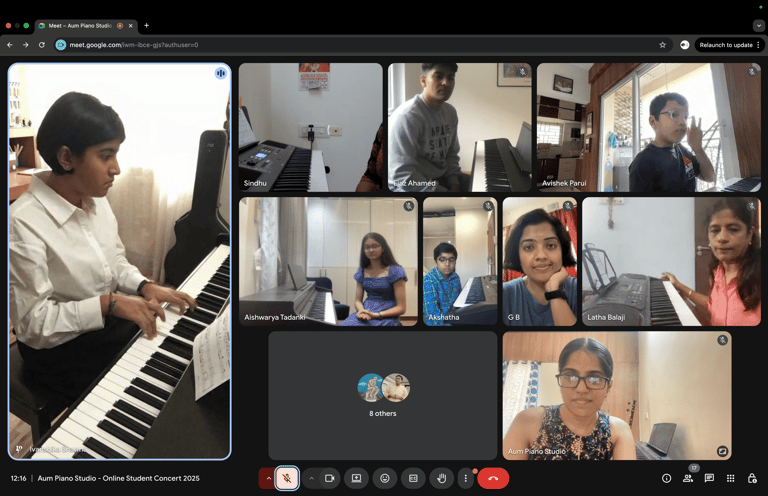
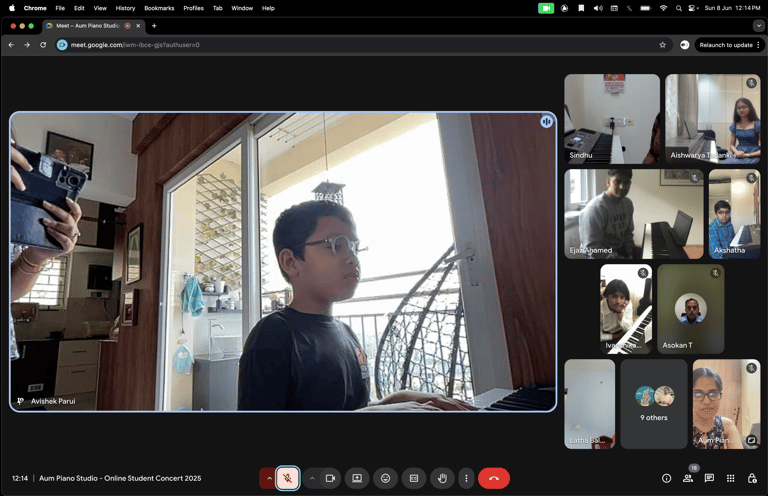
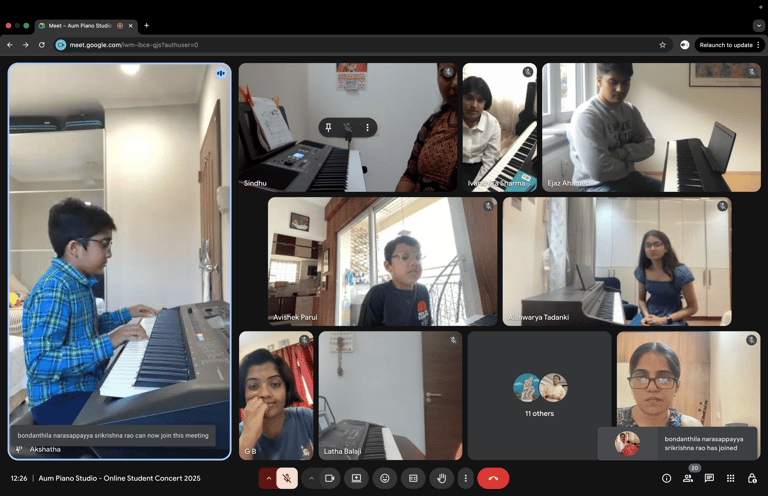
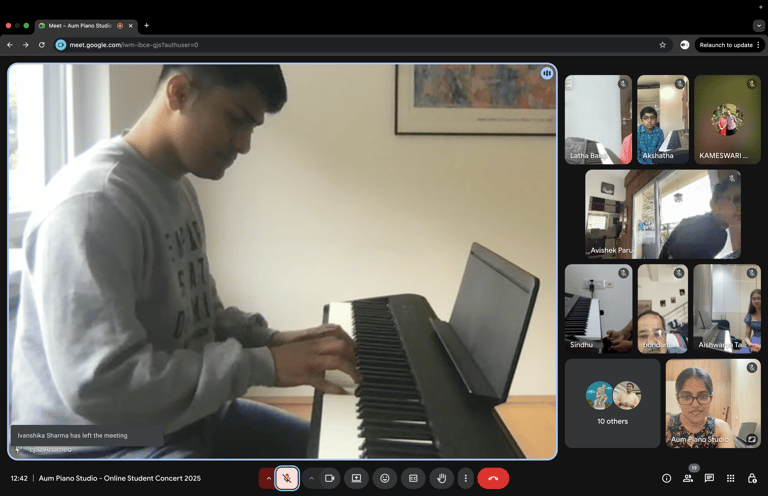
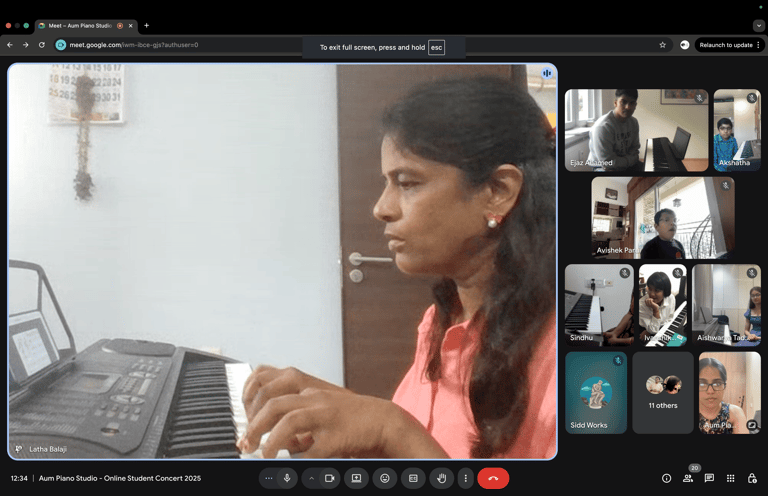
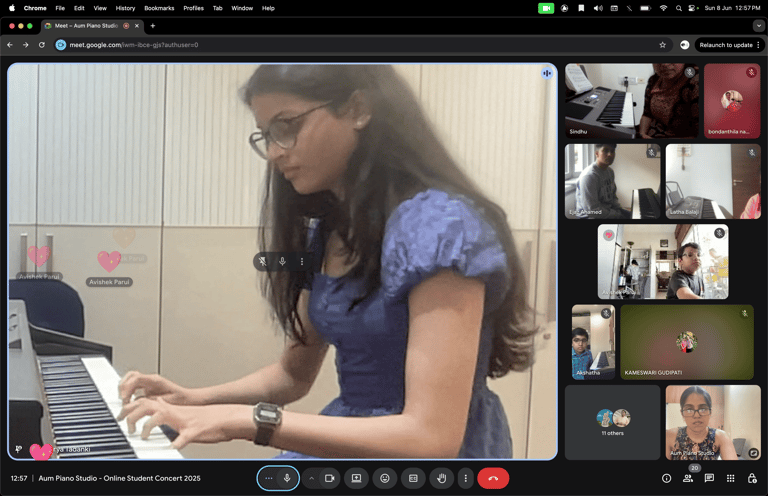






Summer Sounds Online: Aum Piano Studio’s June 2025 Concert Memories
Stage presence isn’t just about music - it’s visual too.
Choose attire that is neat, comfortable, and appropriate for the event
Avoid busy prints and shiny fabric for livestreams - simple colours work best
Practice in the full outfit to ensure comfort while playing or singing
📹 Zoom tip: Position the camera to avoid backlighting and cluttered backgrounds. A blank wall or curtain works great.
👚 8. Dress for Success (Yes, Even Online!)
🎥 9. Record, Review, Repeat
Recording practices helps catch:
Unintentional habits (slouching, rushing, missed dynamics)
Audio issues like background noise or distortion
Strengths worth building on
🎬 Encourage your child to reflect after watching: What went well? What can improve? What would an audience notice?
🎬 10. Day-of Performance Tips
Whether it’s on a stage or on screen, here’s your performance day checklist:
For All Performers:
✅ Eat a balanced meal and hydrate
✅ Warm up early, not frantically
✅ Use breathing or mindfulness to centre focus
✅ Arrive (or log in) early to avoid last-minute panic
For Online Performers:
✅ Check Wi-Fi and close unnecessary apps
✅ Do a quick audio-visual test
✅ Mute notifications and silence devices
✅ Prepare a short intro if required (name, piece, composer)
🏁 11. Celebrate Growth, Not Just Scores
After the performance:
Praise effort and improvement
Discuss how it felt, not just how it sounded
If things didn’t go perfectly, talk about how they recovered - that’s the real skill
✨ Keep a Performance Journal with reflections, feedback, and even photos or screenshots from livestreams.
📦 Create a “Musician’s Memory Box” with programs, certificates, and recital keepsakes. It’s a confidence booster and timeline of growth!
🌍 Final Note: The Stage Is Evolving - So Is the Performer
Music today is shared in concert halls and living rooms, on grand pianos and smartphone screens. Every performance - online or in person - helps build a more confident, expressive musician. By combining smart preparation, emotional support, and a love of sharing music, students and families can turn each event into a meaningful memory - not just a milestone.
Share this on:
About The Author


Padmavathy Divakaran is a distinguished pianist, arranger, and music educator, currently serving as the Director of Aum Piano Studio. Formerly the representative for MTB Exams in Tamil Nadu and Karnataka - a globally recognised music education board based in the UK - she has consistently championed excellence in music education. Padmavathy holds a BA (Honours) in Music from Middlesex University, London, and a Diploma in Higher Education – Music from KM College of Music and Technology, Chennai. Her outstanding talent has been recognised through multiple scholarships and awards, including those presented by Dr. A.R. Rahman. As a performer, she has showcased her versatility across classical and contemporary genres, playing with orchestras in both London and Chennai. She was a core member of the Roliwood Seaboard Ensemble, playing a key role in the global launch of the ROLI Seaboard. Her artistry has earned her the honour of performing at prestigious events, including a special performance for Prince William, Simon Cowell, and other notable personalities at The Founders Forum in the UK - a testament to her global reach and artistic impact.